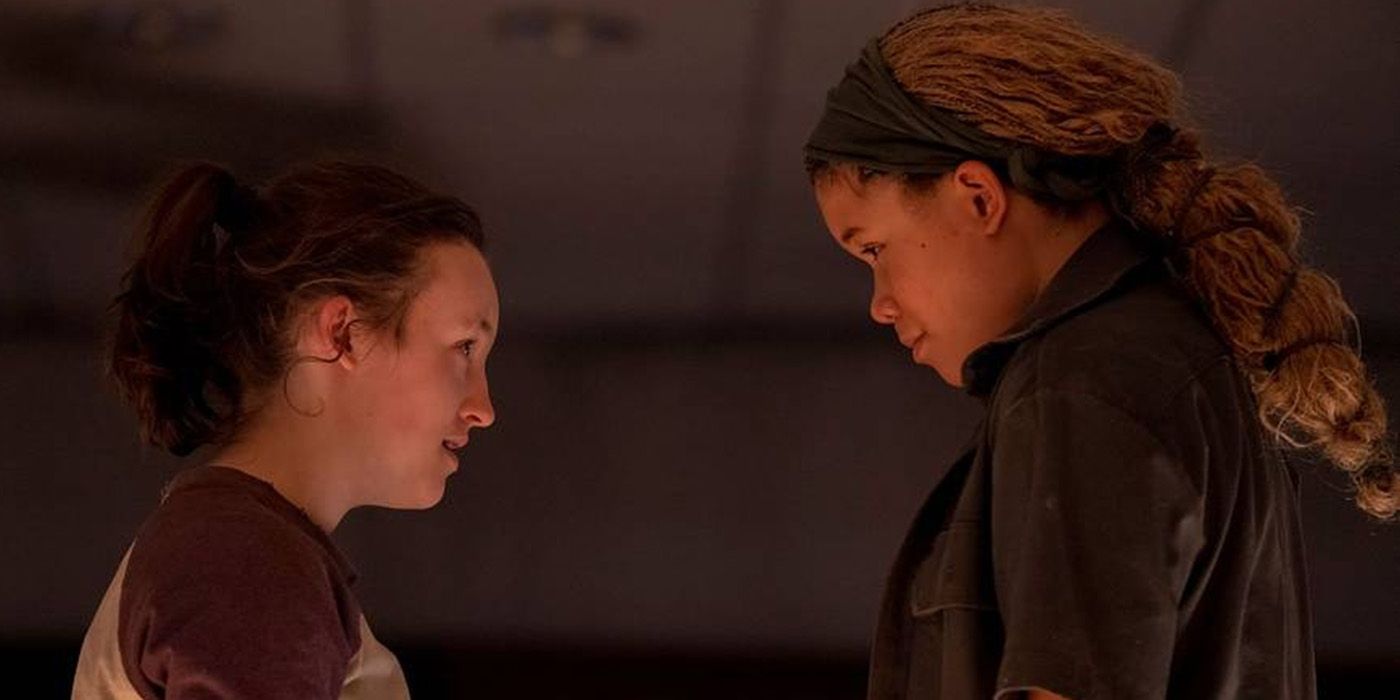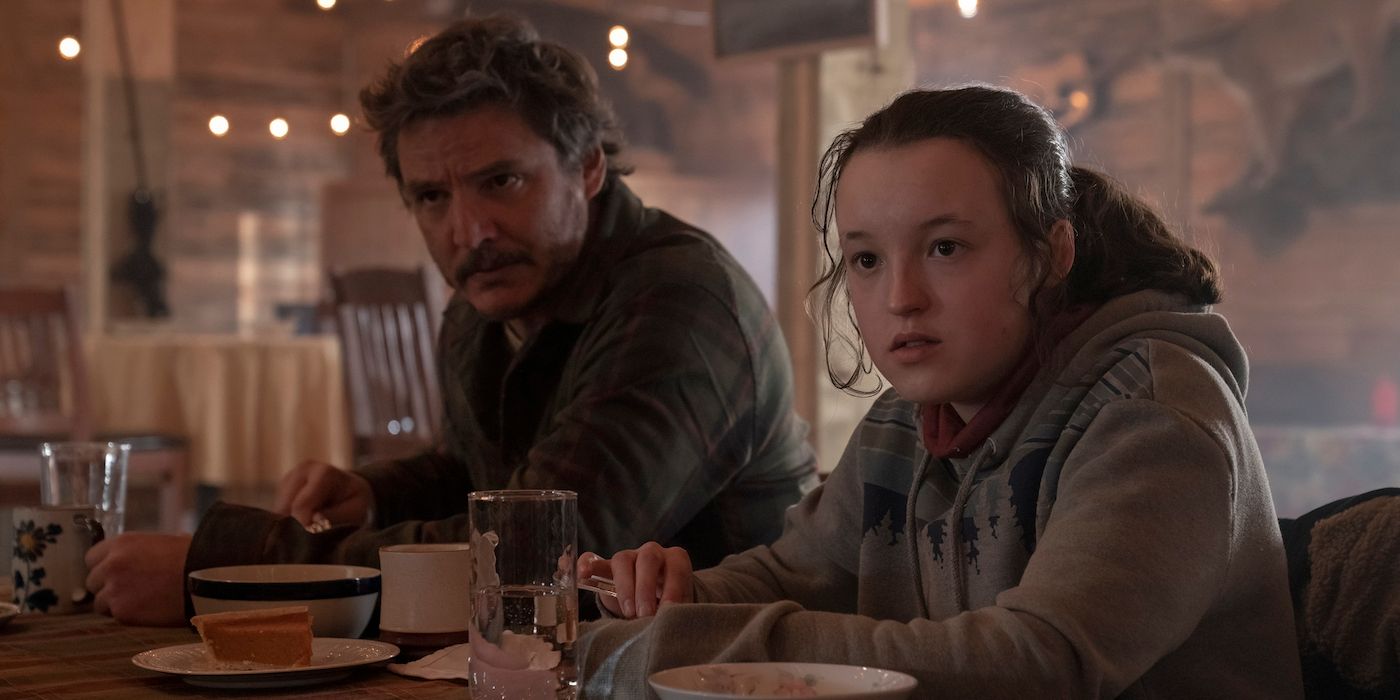Editor’s Note: The following contains spoilers from Episode 7 of The Last of Us and minor spoilers for The Last of Us Part II game.The Last of Us just had one of its most musical episodes yet with this week’s “Left Behind”, and, once again, music was instrumental (no pun intended) for the narrative, full of 80s hits. But one of those stood out not just because it helped us feel the joy in Ellie’s (Bella Ramsey) playfulness as she discovered the wonders of the escalator, but it’s also one of the most important songs in the whole franchise, including the original games. If you played them or even just watched the trailers for the HBO adaptation, you’ve heard it before. We’re talking, of course, about “Take On Me”, by A-ha.
What makes this song special for The Last of Us goes way beyond the awesome synth or the iconic high notes achieved by singer Morten Harket. In many ways, “Take On Me” is the defining song of Ellie’s saga from a young teenager to womanhood, and the series is doing a great job of establishing that. Episode 7 helps a lot in that sense, as her best friend/girlfriend Riley (Storm Reid) finds an A-ha cassette tape on her nightstand. But what does an 80s dance track have to do with a zombie apocalypse and the end of the world? Well, it’s always about the people who survive…
What Does The Song Mean In The Context Of Episode 7?
When we first hear “Take On Me”, Riley has just turned on an escalator to show Ellie. The song may not have much to do with escalators (thank God), but it does say a lot about Ellie and her relationships, be them with Joel (Pedro Pascal), Riley, and even girlfriends to come. Before her journey begins, music is the only thing keeping her sane inside the walls of Boston QZ, and 80s is the preferred period of music of the series, it seems, so it’s natural that this would be the song to define our young hero.
But “Take On Me” says a lot about Ellie and Riley’s last adventure together, too. The whole purpose of the trip to the mall is so Riley can tell Ellie that she’s joined the Fireflies and was transferred to Atlanta QZ, and that would be her last night in Boston. Things were already a little awkward between them before that reveal, but after, it seems none of them knows what to say to the other. Ellie is her angry self and storms off, while Riley tries to get her to come along – “I’ll be gone in a day or two”, she could have sung.
If that seems familiar, it is because it is: “Talking away / Though I don’t know what I’m to say / I’ll say it anyway / Today’s another day to find you shying away,” sings Morten Harket, almost as if describing the couple’s night up to that point. The song describes two people spending a night together, going through the initial awkwardness of getting comfortable at first, but not wanting to leave afterward. They keep finding each other and want to enjoy these moments together, much like Ellie and Riley as they try to figure out who they really are for one another. As the night goes on, they finally understand: “I’ll be coming for your love, okay?”
Even after Riley’s unfortunate death, the song continues to illustrate Ellie’s journey. She has to go on, especially after discovering she’s one of humankind’s best chance against the cordyceps. That’s a lot of pressure to put on a young person’s shoulders, as if coming of age weren’t already enough by itself. “Needless to say / I’m odds and ends,” Ellie may think, but she’s only beginning to learn that the world is so much bigger and that there’s so much more to live. “But I’ll be stumbling away / Slowly learning that life is okay / say after me / It’s no better to be safe than sorry.”
Take On Me Plays a Major Part in Ellie’s Journey
In the original games by Naughty Dog, though, “Take On Me” achieved its iconic status in The Last of Us in the sequel game. We learn that Ellie has learned to play the guitar, and performs an acoustic version of the song to serenade her girlfriend, Dina (Shannon Woodward). This is a beautiful cover, sung by Ellie’s original voice actor, Ashley Johnson – who’s also bound to appear in the series, likely as Ellie’s mother, Anna.
Back then, there was no series adaptation to further build upon the songs meaning, so it was a little more simple. Now, we get an interesting parallel between Ellie’s relationship with Riley and her dynamics with Dina in The Last of Us Part II. Ellie does her best to alienate Dina when she decides to go after those who wronged her in the beginning of the game (the “shying away” part).
Even though there are differences between the two versions, Ellie is essentially the same character, so she does get angry and shut people out in the game, too. She is an awkward person who almost never knows what to say, but learns very slowly that life is indeed okay (but, like, really slowly). And, of course, “It’s no better to be safe than sorry” is basically her personal motto, despite her insecurities.
Another of Ellie’s key relationships is the father-daughter one she has with Joel. In this context, the song has a whole different meaning, as Joel is the one who was “shying away” from Ellie at first, afraid of losing yet another person. They weren’t prepared to be in the situation they found themselves at the beginning of the first game, but it eventually works out for the best, as he, too, learns that life is okay because of her, and leaves behind the brutal ways of his past.
Ellie’s serenade for Dina is fascinating to watch because, thanks to the amazing graphics, we can see in her facial expressions and tone that she’s clearly reminiscing about her own past while singing “Take On Me”, aware of how much that song really means for her and those in her life.
Read More About ‘The Last of Us’
Stay connected with us on social media platform for instant update click here to join our Twitter, & Facebook
We are now on Telegram. Click here to join our channel (@TechiUpdate) and stay updated with the latest Technology headlines.
For all the latest TV News Click Here


